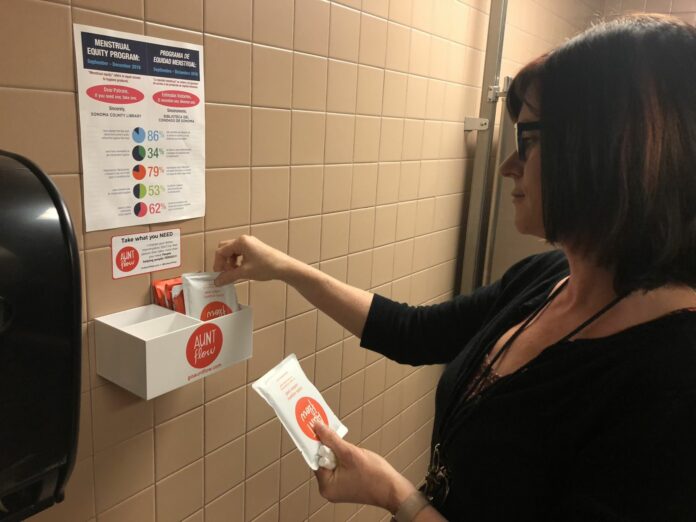Equal access to menstrual hygiene products
A pilot program introduced at the public library has been stirring the curiosity of patrons and staff. Branch manager Jon Haupt said he wasn’t sure what the reaction would be to the Menstrual Equity Program.
“It feels like it’s been a success,” he said. “My own understanding has been raised.”
The three-month pilot program started in September at the Healdsburg Regional Library, 139 Piper St. Since then free tampons and pads have been made available in the public restrooms as part of the program’s mission to provide free and equal access to menstrual hygiene supplies.
Haupt said it’s rare that a day goes by when no supplies are removed from the shelf. The cost of the pilot program was a total of approximately $100 for three months of supplies at the Healdsburg branch, and Haupt said enough supplies are available for several more months. From Sept. 1 to Nov. 1, patrons took approximately 104 pads and 18 tampons. Haupt said he is hopeful the program will continue.
“I can’t see any reason why it would be stopped,” he said. “It’s the right thing to do.”
The idea for the program came from a librarian at a different Sonoma County branch. When Rosalie Abbott began working as a Young Adult Services Librarian at the Sebastopol Regional Library in 2017, she learned something new.
“High school students, who knew me from my previous work at our local high schools, felt comfortable asking for menstrual supplies when they were in an emergency situation at the library… which turned out to be fairly often,” Abbott said.
“Immediately, I had the idea of creating a space where teens could access these supplies when needed — but the question was how.”
With a librarian’s thirst for knowledge, Abbott began to research the topic and found Sebastopol teens weren’t the only ones encountering these emergency situations without supplies.
Statistics from a national study for Free The Tampons, an organization promoting freely accessible menstrual items, show 86 percent of women start their period unexpectedly in public without the supplies they need.
“Once I began my research, it became more and more clear that our local libraries might be able to play a more significant role in providing necessary sanitary supplies, just as we provide toilet paper as a convenience for our patrons,” Abbott said.
Out of that concept, Abbott developed the Menstrual Equity Program. In July, with support from her Sebastopol colleagues, she sent the project to the Sonoma County Library management for approval.
With the green light, the pilot project was rolled out in September in five branches of the Sonoma County Library: Central Santa Rosa, Healdsburg, Rincon Valley, Sebastopol and Sonoma Valley.
Free tampons and pads were made available not only in the women’s restroom, but also in the men’s restroom. Abbott said offering supplies in the men’s restrooms served two purposes.
“Allowing boys and men access to these supplies might satisfy curiosity and minimize mystery that surrounds periods,” she said. “The free supplies also provided access for transgender men who menstruate, particularly adolescents.”
Signage and book displays were placed in the libraries to help educate and raise awareness about menstruation as a normal and necessary human function.
Abbott said the signage in the library, including phrases like, “Keep calm and menstruate on,” has opened up a lot of conversation with library guests. Those discussions help to facilitate a better understanding of a topic that has often been considered taboo.
“If we talk about things in a matter of fact way, it’s just a matter of fact,” she said.
In a Free The Tampons national study, 57 percent of women ages 18-54 in the U.S. consider getting caught in public without the needed menstrual supplies embarrassing, emotional ordeal.
“People who menstruate… whether homeless, young, older or just caught by surprise — must stop everything until this need is met. This means that learning, studying, researching, reading, working, experiencing library programs or just ‘being’ in the library is not possible until this basic, normal human experience is taken care of,” she said.
For more information on the Menstrual Equity Program contact Haupt at 707-433-3772 or via email at jh****@so***********.org. To learn more about the Free The Tampons Foundation, visit https://www.freethetampons.org/.
72.3
F
Healdsburg
April 4, 2025








